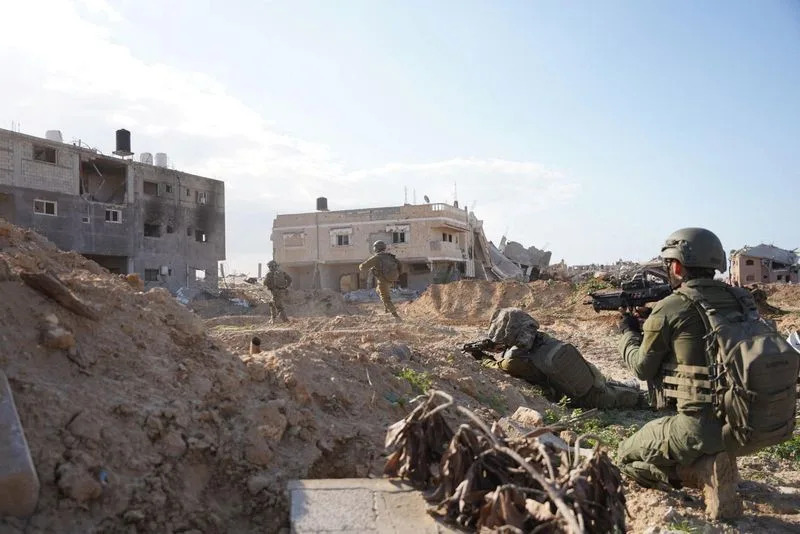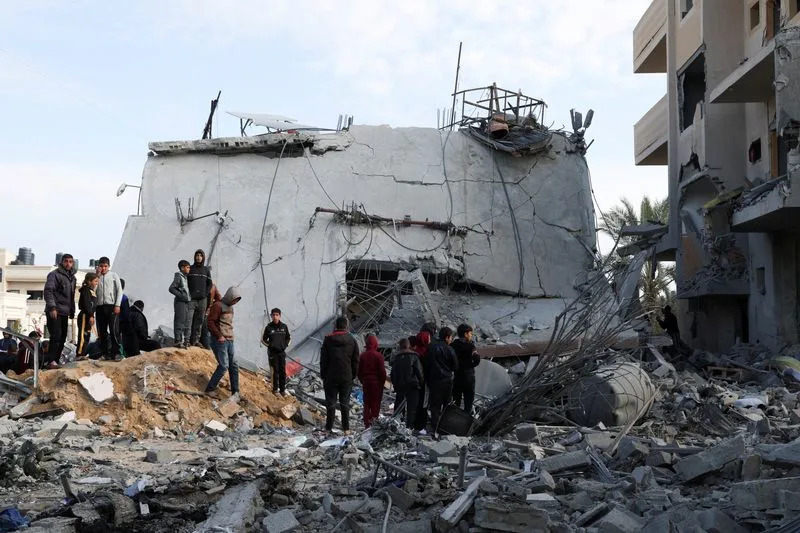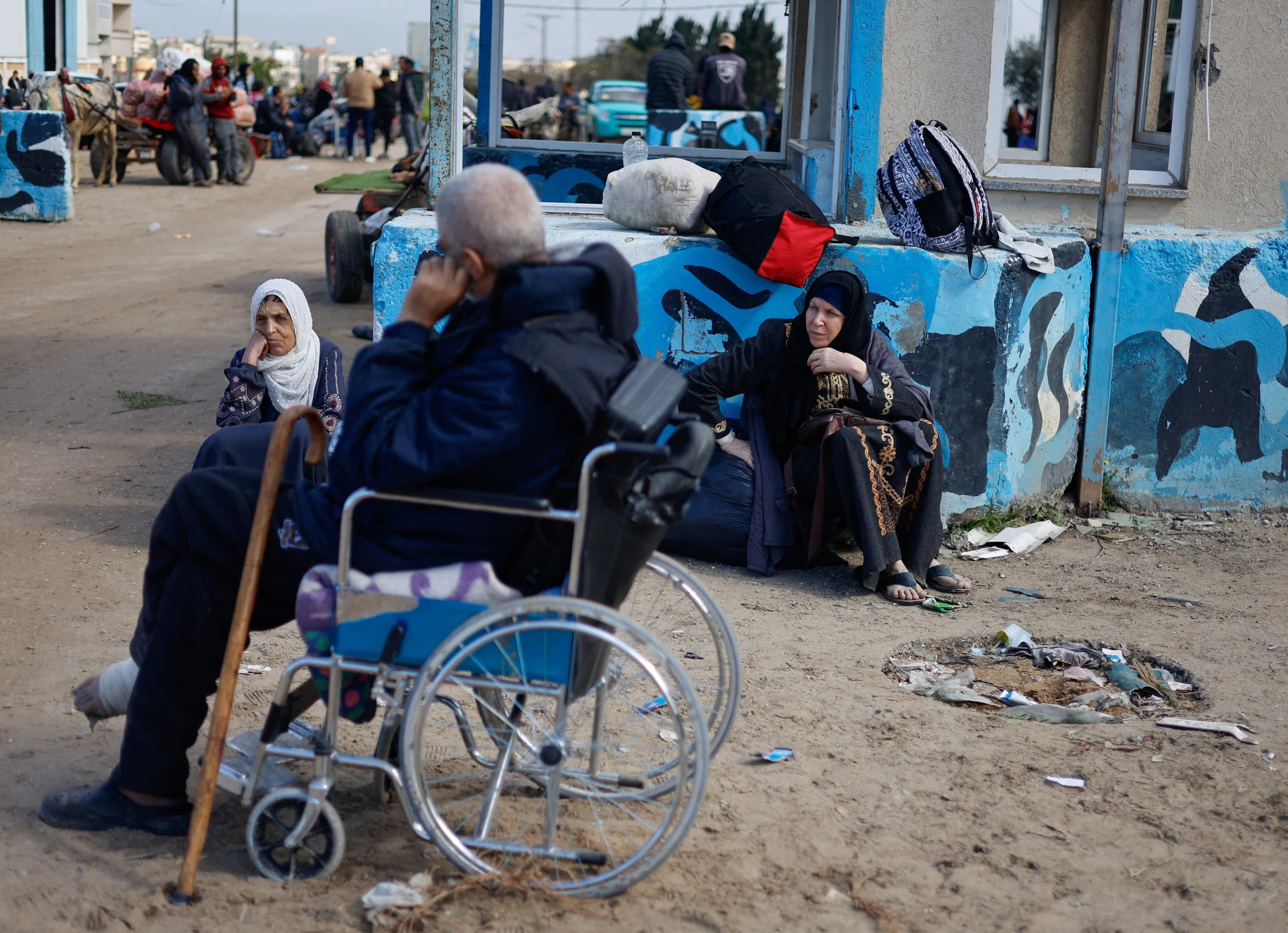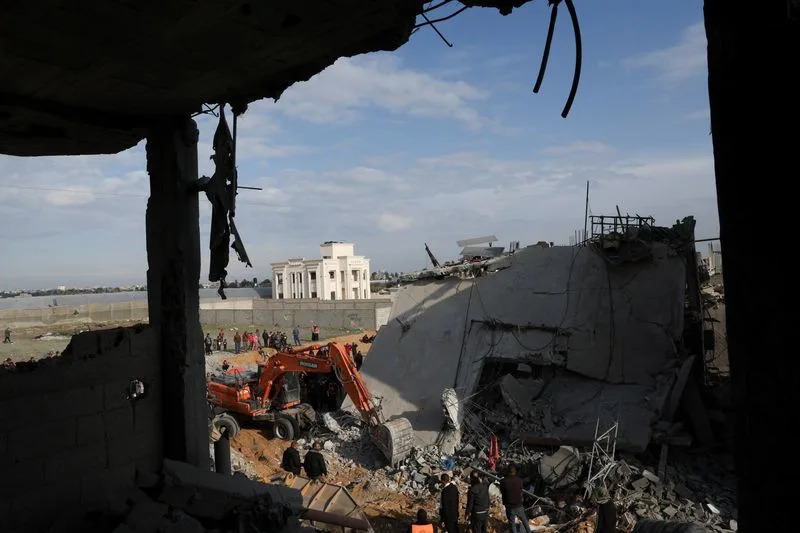Israeli forces carried out arrests in Gaza's largest functioning hospital, health officials and the military said on Saturday, as airstrikes hit across the enclave and rain battered Palestinians taking shelter in Rafah.
Israeli forces raided the Nasser Hospital in Khan Younis on Thursday as they pressed their war on Hamas, the Palestinian Islamist group that rules the enclave.
"Occupation forces detained a large number of medical staff members inside Nasser Medical Complex, which they (Israel) turned into a military base," said Gaza Health Ministry spokesman Ashraf al-Qidra.
Israel's Prime Minister Benjamin Netanyahu on Saturday pledged to push on with the military campaign and said troops would move into the southern border city of Rafah.
The Israeli military said it was hunting for militants in Nasser and had so far arrested 100 suspects on the premises, killed gunmen near the hospital and found weapons inside it.
Hamas has denied allegations that its fighters use medical facilities for cover. At least two released Israeli hostages have said they were held in Nasser and Israel has released pictures and videos supporting its claim that Hamas operates within medical compounds.
The Israeli incursion into the hospital has raised alarm about patients, medical workers and displaced Palestinians sheltering there.
About 10,000 people were seeking shelter at the hospital earlier this week, but many left either in anticipation of the Israeli raid or because of Israeli orders to evacuate, the Gaza Health Ministry said.
Further south in Rafah, where more than half of Gaza's 2.3 million population are sheltering, the winter cold added to already dire conditions when wind blew away some tents of the displaced and rain flooded others.
INTERNATIONAL CONCERN FOR RAFAH
Israeli plans to storm Rafah have prompted international concern that such action would sharply worsen the humanitarian crisis in Gaza.
Netanyahu said Israel was intent on taking out Hamas battalions in Rafah - regardless of whether a deal was reached to free the remaining Israeli hostages - and that there will be room to evacuate the civilian population, including in areas north of the city.
"But we need to be sure to do this in an orderly fashion. That's the directive I gave to the IDF (Israel Defense Forces). The IDF is doing it and preparing it."
"Yes, there is a lot of opposition in the world, but this is exactly the moment we have to stand and say 'we will not do half the work or three-quarters of the work'."
Hamas chief Ismail Haniyeh blamed Israel for a lack of progress in achieving a ceasefire deal in Gaza, the group said in a statement on Saturday.
Haniyeh added that Hamas would not accept anything less than a complete cessation of hostilities, Israeli withdrawal from Gaza, and "lifting of the unjust siege," as well as a release of Palestinian prisoners serving long sentences in Israeli jails.
Israel's air and ground offensive has devastated much of Gaza and forced nearly all of its inhabitants from their homes. Palestinian health authorities say 28,858 people, mostly civilians, have been killed.
The war began when Hamas sent fighters into Israel on Oct. 7, killing 1,200 people, mostly civilians, and seizing 253 hostages, according to Israeli tallies.
At least 83 people were killed in airstrikes across the Gaza Strip since Friday, health officials said, including one person on Saturday in Rafah, an area that borders Egypt and which Israel says is Hamas' last bastion.
Residents and medics said more died as night fell on Saturday when Israeli warplanes carried several airstrikes on at least seven houses, killing and wounding dozens of people. Hamas media outlets put the number of those killed at 38. The Israeli army spokesperson said they were checking into the reported strikes.
The Israeli military said its jets had killed numerous militants in Gaza fighting since Friday.
Across the border, air raid sirens warning of incoming rockets sounded in the southern Israeli city of Ashkelon on Saturday.
Five patients die at Nasser hospital after Israeli raid cuts off power and leads to ‘deeply alarming’ scenes
Five patients have died at Nasser Hospital in Khan Younis after an Israeli raid caused the facility to lose power, the Ministry of Health in Hamas-controlled Gaza said, as the World Health of Organization (WHO) decried the “deeply alarming” situation.
The ministry said the Nasser Medical Complex was “without electricity, water, food, and heating” in a statement on Friday morning, after the Israel Defense Forces (IDF) launched the raid Thursday and detained a number of people.
The Gaza ministry also announced in a separate Friday morning update that two pregnant women had delivered children in the hospital “under extremely challenging and inhumane conditions.”
It later accused Israeli forces of forcing “male patients who are able to move and their companions to evacuate the old Nasser building without their belongings and relocate to the maternity building, which has been converted into a military barracks.”
The IDF pressed ahead with its raid on the facility Friday, and said in a statement they had detained more than 20 suspects relating to Hamas’ October 7 attack on Israel.
“Troops located weapons inside the hospital and apprehended dozens of terror suspects,” the Israeli military claimed in a statement on Friday. The IDF did not provide any additional details on the people detained or the nature of their alleged involvement in the Hamas attack.
The Israeli military also said it had found weapons inside the facility, including mortar shells and grenades, releasing a low-resolution photograph of the alleged weapons stash. CNN could not independently verify where and when the photograph had been taken.
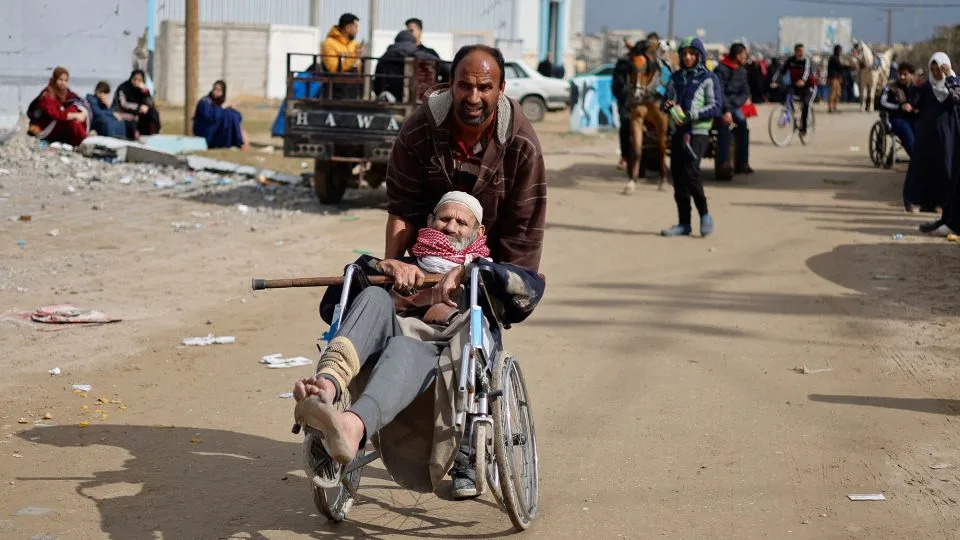
The IDF’s raid on what was the largest hospital still functioning in Gaza has left international bodies deeply concerned. “The military raid at Nasser Medical Complex and reports emerging from the hospitals are deeply alarming,” World Health Organization (WHO) spokesperson Tarik Jasarevic said in Geneva on Friday.
“Patients, health workers, and civilians seeking refuge deserve safety, not peril in places of healing. Reports of forcing the transfer of many patients into a different building are gravely concerning.”
According to WHO, Nasser was already “barely functional,” with limited ability to provide urgent care.
Jasarevic said “critically injured and sick patients remain at the hospital. There is an urgent need to deliver fuel to the hospital to ensure the continuation of lifesaving services.”
“Further degradation of the facility means more lives lost, more illness and suffering,” he added. “The hospital is the backbone of the health system in southern Gaza and must remain functional.
On launching its raid, the IDF said the operation was led by intelligence gathered in part from released hostages. Israel said it believed the bodies of dead hostages were being held inside the hospital. Hamas denied the claims, saying the group had “no business” at the hospital.
IDF spokesman Daniel Hagari said Thursday evening that troops hadn’t found any hostages, but were continuing to scan the facility.
“Our forces were in the hospital the last few hours and looking for hostages. We haven’t found anything yet. But we are scanning the area, and we will pick anything that is relevant,” Hagari said during a briefing.
Hagari said using hospitals “for terrorist activities” and as military bases, as well as holding hostages there, were contrary to international law, though Hamas has denied those claims.
The IDF said that they had not targeted the hospital’s power supply, and that a generator malfunction had caused the power outage.
Despite the outage, “all vital systems” remained functional due to a backup power system, the IDF said, adding that troops with the Israeli military had also supplied an alternative generator, food for infants, water, and diesel fuel to the hospital.
Hospitals are protected civilian objects under international humanitarian law. It is illegal, with few exceptions, to attack medical facilities, or to otherwise prevent them from providing care. A hospital can only lose its protected status if it is used by an armed group for acts that are considered “harmful to the enemy.”
But, even then, patients and doctors inside are still protected by the principle of proportionality. A warning must be given, and time for safe evacuation, before carrying out an attack.
Ahead of its operation on the Nasser Hospital, the IDF ordered hundreds of civilians to leave the facility, which they had been using as a shelter. Medical staff have shared videos in the last few days, seen by CNN, which show widespread destruction and damage to the hospital infrastructure.
A doctor trapped inside the complex said in a message Thursday that was shared with CNN that medical staff was unable to reach the hospital’s ICU as the army was operating inside it. “All the ICU patients will die,” he said.
The surgeon, who asked not to be named for security reasons, added that the wards and corridors of the hospital are “flooded with beds” and that “most of the patients do not have the chance to get the medicine and their health care … We cannot make rounds on patients. We cannot move between beds.”
Israeli forces shelled the hospital early Thursday, killing and injuring an “undetermined number of people,” according to Doctors Without Borders, also known as Médecins Sans Frontières (MSF). Since the attack, one of their colleagues remains unaccounted for.
MSF staff were forced to flee the hospital through a checkpoint set up by the Israeli military, the agency said, adding that one employee “was detained” there.
Gaza's Nasser hospital: Fears for patients as Israeli raid continues
The Israeli military says its special forces are still inside the Nasser hospital in Gaza as fears grow for patients at the site.
Israel launched what it described as a "precise and limited mission" there on Thursday. The military says it has caught "dozens of terror suspects".
Hamas dismissed that claim as "lies". The Hamas-run health ministry said five people died after generators failed.
The World Health Organization (WHO) said the facility urgently needed fuel.
It said the fuel was vital to "ensure the continuation of the provision of life-saving services".
Tarik Jasarevic, a WHO spokesperson, said there were now reports that the orthopaedic unit at the hospital, in the city of Khan Younis, had been damaged.
"That obviously reduces the ability to provide the urgent medical care," he said, adding there were still "critically injured and sick patients" at the hospital.
"More degradation to the hospital means more lives being lost."
Nasser is the main hospital in southern Gaza, and is one of the few still functioning. It has been the scene of intense fighting between the IDF and Hamas for days.
An injured man who had to leave the hospital said the conditions there were dire.
"Since they besieged it, there is no water or food," Raed Abed told the Associated Press.
"Garbage is widespread, and sewage has flooded the emergency department."
The hospital's director, Nahed Abu-Teima, told BBC Arabic the situation inside was "catastrophic and very dangerous".
The Hamas-run health ministry reported on Friday that the five people who died at the hospital did so after the electricity generators went down and oxygen could not be provided.
The deaths have not been independently verified.
On Wednesday, the Israeli Defense Forces (IDF) ordered thousands of displaced people who had been sheltering there to leave.
Images, verified by the BBC, showed medical staff rushing patients on stretchers through a corridor filled with smoke or dust.
The IDF believes Hamas has been using hospitals and other civilian bases as shields for military activities.
"We can't give them [Hamas] a free pass, we have to make sure that they are pursued and hunted down," IDF spokesperson Lt Col Peter Lerner told the BBC.
He said the military had been making "a huge effort to evacuate people from the hospital in order to get them out of harm's way", denying claims that civilians had been targeted.
The IDF said that among those it had captured at the hospital were 20 Hamas members who were part of the 7 October attacks on Israel.
It also said it had found weapons, including grenades, at the facility.
The military is also searching for the bodies of Israeli hostages which it said intelligence suggests might be hidden in the hospital.
Meanwhile, the Palestinian Red Crescent Society (PRCS) said Israeli tanks were targeting the nearby Al-Amal hospital, "resulting in very severe damage in two nursing rooms".
They wrote on social media that nobody had been hurt.
Intense hostilities have been reported around the hospital recently. The PRCS said it was raided last week after some 8,000 displaced people and patients complied with an order to evacuate.
On Friday, they said that two doctors who were arrested during the raid had been released, while 12 other staff remained in custody.
Israel launched its military offensive after waves of Hamas fighters burst through Israel's border on 7 October, killing about 1,200 people - mainly civilians - and taking 253 others back to Gaza as hostages.
The Hamas-run health ministry says more than 28,700 people, mainly women and children - have been killed in Israel's campaign.
Israel is facing increasing international pressure to show restraint but efforts to negotiate an end to the fighting have not yet yielded any results.
A senior Palestinian official familiar with the ceasefire talks told the BBC that the gap between the negotiating parties was still wide and there were disagreements over many of the proposed provisions.
Senior officials from the US, Israel, Egypt and Qatar have been meeting in Cairo this week to try and hammer out a deal.
The official said that the main issue remains the disagreement with Israeli Prime Minister Benjamin Netanyahu over what happens the day after the war is over. The US want to rely on a strengthened Palestinian Authority, while Israel is against having a single administration in charge of the West Bank and Gaza.
Another disagreement is over Israel's aim of completely destroying Hamas, which the US thinks will be difficult to achieve anytime soon.
The US is said to be trying to pressure the two sides to reach a long period of calm to make it difficult for the two sides to return to fighting again.
Israel searches Gaza’s largest functioning hospital for hostage remains after raid leaves five patients dead
Insights from The Guardian, The Associated Press, and The Washington Post
The News
Israeli forces said Thursday that they had raided Nasser Hospital — the largest functioning hospital remaining in Gaza — arresting more than 20 people based on “intelligence indicating terrorist activity by Hamas in the hospital.” Israel said it was also looking for hostage remains in the hospital, but hasn’t yet uncovered any.
The Palestinian militant group Hamas denied having any presence in the hospital, and Gaza’s Hamas-run Health Ministry said at least five patients died after Israel cut electricity during the raid, cutting off oxygen flows and other critical medical functions.
Gaza’s health authority said Israel forced out dozens of staff, patients, and others who were sheltering in the hospital, and Doctors Without Borders, a humanitarian NGO, said Israel shelled the hospital despite telling medical staff and patients that they did not need to evacuate. An Israeli military spokesperson said the operation was conducted to allow the hospital to continue treating patients, adding that there was no obligation for anyone to evacuate.
But one man who had been sheltering in the hospital told Reuters that some people who attempted to leave on Wednesday were shot at. “This morning they said there was a safe passage, so we left, but it wasn’t safe,” he said. “They approached us with a bulldozer and a tank, they insulted us and left us for four hours under the sun.”
The U.N. Human Rights Office said the raid on Nasser Hospital appears to be “part of a pattern of attacks by Israeli forces striking essential life-saving civilian infrastructure in Gaza, especially hospitals.”
Attacking hospitals could be a war crime
Israel and Hamas have each accused the other of weaponizing civilian hospitals, which are protected under international humanitarian law. Israel has raided several since the war began, claiming that the militant group uses them as headquarters, in an abuse of their protection under international law. Hamas has insisted that they were medical centers and has accused the Israeli military of using the allegation as an excuse to target Gaza’s vulnerable population.
“It is forbidden to turn recognized civilian hospitals into a conflict zone,” Mathilde Philip-Gay, an expert on international humanitarian law, told The Guardian in November after Israel’s troops stormed Gaza’s Al-Shifa hospital complex. Equally, using “civilian populations, the sick or the injured as human shields, it is a war crime, as is fighting from inside a hospital,” Philip-Gay added.
Israel’s claims of Hamas bases in hospitals remain inconclusive
Israel justified raiding Gaza’s largest hospital, Al-Shifa, by claiming that there was a sprawling Hamas command center under it, but several media outlets have since suggested that the IDF’s proof is inconclusive or “elusive” at best, based on footage and photos. The Associated Press reported last November that “there was no conclusive proof” of an elaborate Hamas headquarters below Al-Shifa, CNN’s independent analysis of an IDF video concluded that it did not “establish without a doubt that there is a command center under Al-Shifa,” and a Washington Post investigation in December also reported that the Israeli government’s evidence fell short of proving it was used as a Hamas command post.
However, declassified U.S. intelligence in January showed that Washington believes that Hamas and another Palestinian group used Al-Shifa “to command forces and hold some hostages,” The New York Times reported, while an investigation by the paper this month said evidence suggested Hamas “used the hospital for cover, stored weapons inside it and maintained a hardened tunnel beneath the complex.”
Israel bombards Gaza, with biggest functioning hospital under siege
Gaza's largest functioning hospital was under siege on Friday in Israel's war with Islamist group Hamas, leaving patients and doctors helpless in the chaos as warplanes struck Rafah, the last refuge for Palestinians in the enclave, officials said.
Israeli forces remained in Nasser Hospital in the town of Khan Younis after raiding it early Thursday. The Gaza Health Ministry said five intensive care patients died on Friday due to power outages and lack of oxygen supply caused by the attack.
Israel said it moved into the hospital because Hamas militants were hiding there. The Israeli military said on Friday its troops detained more than 20 militants in the hospital who participated in the Oct. 7 attacks on Israel and dozens of others for questioning. Hamas denies there were militants in the hospital, describing the claim as "lies aimed to cover up for destroying hospitals."
The Gaza Health Ministry said the hospital lost power and remained without electricity on Friday, jeopardising patient care. But the Israeli military said it repaired one generator and provided another, ensuring "all vital systems continued to operate."
Two pregnant women gave birth on Friday “under tough conditions -- no water, no food and no way of warming them up” in cold weather, said ministry spokesman Ashraf Al-Qidra.
The ministry said Israeli forces inside Nasser Hospital forced women and children into the maternity department, which it turned into a military area. Women were not allowed to take any of their belongings.
According to the ministry, Israeli soldiers stopped an aid convoy outside the hospital, which was unable to deliver supplies. The military said it provided aid including baby food and water.
The incursion at the hospital raised alarm about patients, medical workers and displaced Palestinians sheltering there.
"There are still critically injured and sick patients that are inside the hospital," said Tarik Jasarevic, spokesperson for the World Health Organization, which said its staff was trying to reach the hospital after the Israeli raid.
"There is an urgent need to deliver fuel to ensure the continuation of the provision of life-saving services."
About 10,000 people were seeking shelter at the hospital earlier this week, but many left either in anticipation of the Israeli raid or because of Israeli orders to evacuate, the Gaza Health Ministry said.
Israel said its soldiers found ammunition and weapons in the hospital, as well as medication bearing names of some hostages.
At least two released Israeli hostages have said they were held in Nasser, which Hamas has denied.
The war began when Iran-backed Hamas sent fighters into Israel on Oct. 7, killing 1,200 people, mostly civilians, and seizing 253 hostages, according to Israeli tallies.
Israel's air and ground offensive has since devastated much of Gaza, killing 28,775 people, also mostly civilians according to Palestinian health authorities, and forcing nearly all of its more than 2 million inhabitants from their homes.
There is mounting international concern the humanitarian crisis in Gaza could worsen sharply if the Israeli military decides to storm the southern border city of Rafah, where more than half of the densely populated enclave's people are taking shelter in anticipation of a major attack.
An Israeli air strike hit two houses in Rafah in the southern Gaza Strip on Friday, killing 10 people and wounding several others, health officials said.
Rida Sobh, mourning the death of her sister in one of the Rafah strikes, said the house had been totally destroyed in the midnight attack, which also killed all her sister's children, her aunt, husband and cousin.
"Rafah is not safe. Everywhere in the Gaza Strip is a target. Don't say that Rafah is safe. From Beit Hanoun to Rafah, it is all dangerous."



